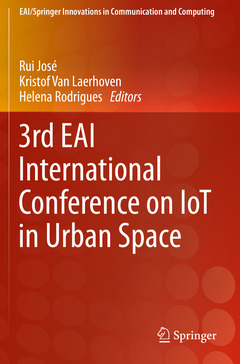Description
3rd EAI International Conference on IoT in Urban Space, 1st ed. 2020
EAI/Springer Innovations in Communication and Computing Series
Language: English
Subjects for 3rd EAI International Conference on IoT in Urban Space:
Publication date: 11-2020
179 p. · 15.5x23.5 cm · Paperback
Publication date: 11-2019
Support: Print on demand
Description
/li>Contents
/li>Biography
/li>Comment
/li>
Introduction.- CityFlow: Supporting Spatial-Temporal Edge Computing for Urban Machine Learning Applications.- Ethical and Social Aspects of Connected and Autonomous Vehicles: A Focus on Stakeholders’ Responsibility and Customers’ Willingness to Share Data.- Evaluating Street Networks for Predictive Policing.- SESSION 2: Design challenges in Urban IoT.- Challenges in Using IoT in Public Spaces Exploring new Digital Affordances of city life.- A Comprehensive View on Quality Characteristics of the IoT Solutions.- Connected Vehicles in the Shark Tank: Rethinking the Challenge for Cybersecurity to Keep Pace with Digital Innovation.- SESSION 3: Methods and technologies for IoT.- AudioIO: Indoor Outdoor Detection on smartphones via Active Sound Probing.- Day-ahead Load Forecasting based on Conditional Linear Predictions with Smoothed Daily Profile.- GANonymizer: Image Anonymization Method Integrating Object Detection and Generative Adversarial Network.- Performance Evaluation of Source Routing Minimum Cost Forwarding Protocol over 6TiSCH Applied to the OpenMote-B platform.- SESSION 4: Urban mobility and Connected Vehicles.- Analysis of time of use and intermodality of ride-hailing services in Singapore using mobile web traffic data.- An Exploratory Study of Relations between Site Features and I2V Link Performance.- Urban Landscape Revolution: The Potential of Connected Vehicles and Their Impact on the Mobility Ecosystem.- Review of Technological and Economic Considerations on Future Vehicle Design: Autonomous, Connected, Electric, and Shared Vehicles.- Conclusion.
Rui Jose is an Assistant Professor at the Information Systems Department of the University of Minho. He has a Phd in Computer Science from Lancaster University and his main research interests are ubiquitous computing and interactive environments. He is a member of the Mobile and Ubiquitous Systems Group where he runs the Research Program on Situated Displays for Smart Places, a multi-disciplinary long-term initiative that aims to develop and evaluate a new concept of situated displays as shared, networked, pro-active and strongly situated information artefacts that are situated within a place and provide an execution environment for situated applications.
Kristof Van Laerhoven is a Professor in Ubiquitous Computing at the University of Siegen. Prior to that, he was Professor for Embedded Systems at the University of Freiburg and heading an “Emmy-Noether” Junior Research group (funded by the German Research Foundation – DFG) in Embedded Sensing Systems at the Technical University of Darmstadt. He obtained his Ph.D. degree at Lancaster University (UK) and his Masters degree from the University of Brussels (Belgium). His research focuses on the design and evaluation of wearable and networked embedded systems that are capable of analyzing and detecting phenomena with pattern recognition, data mining, and machine learning algorithms. He was general chair of the 17th International Conference on Wearable Computers (IEEE/ACM ISWC 2013) in Zurich and has published over 100 papers in peer-reviewed journals and conferences on wearable, mobile, and ubiquitous computing, of which several were granted a best-paper award. Helena Rodrigues is Assistant Professor at Faculdade de Ciências Sociais e Humanas – Universidade NOVA de Lisboa and the founder of Laboratory for Music and Communication in Infancy of the research unit CESEM at the same institution. She has been the organizer of multiple innovative initiatives, as diverse as the Bebé Babá Project and the annual In
